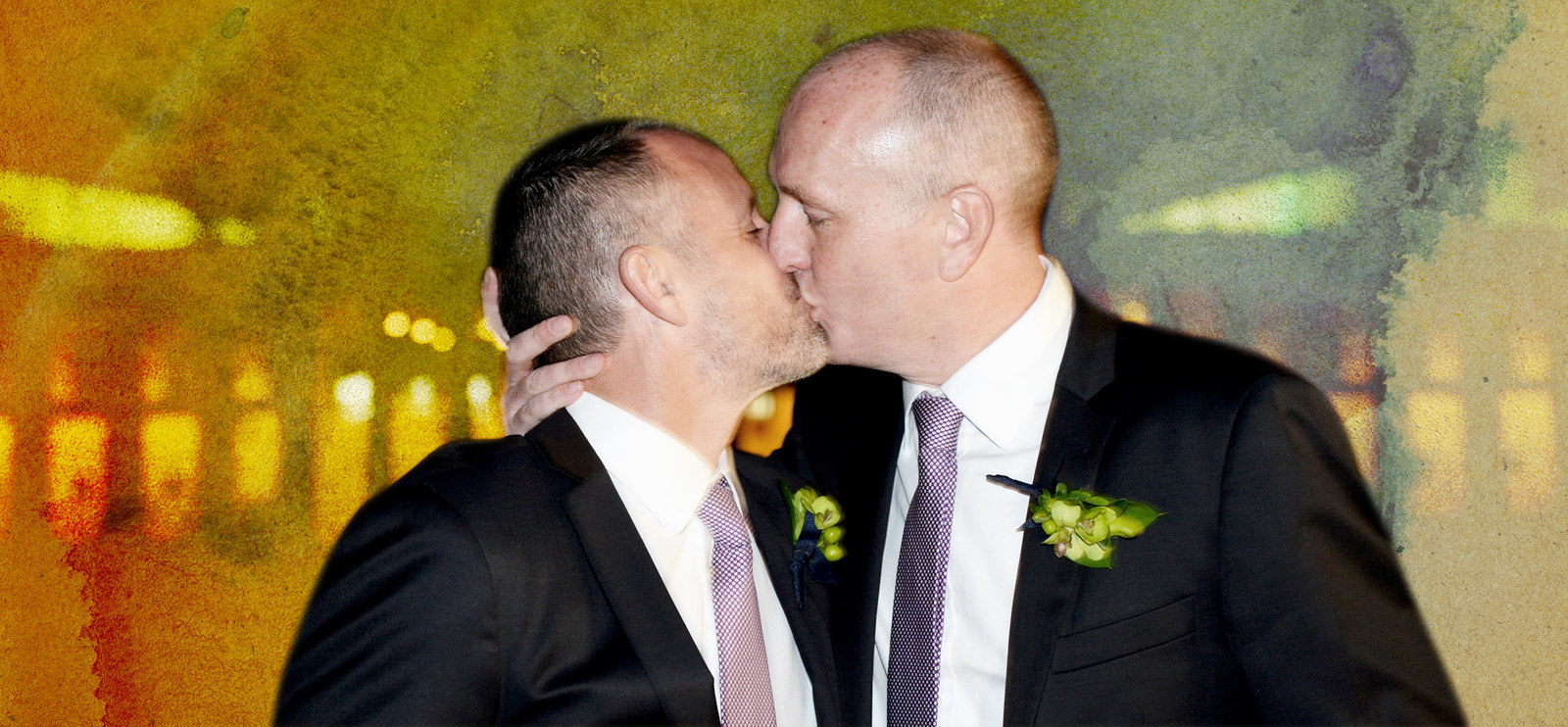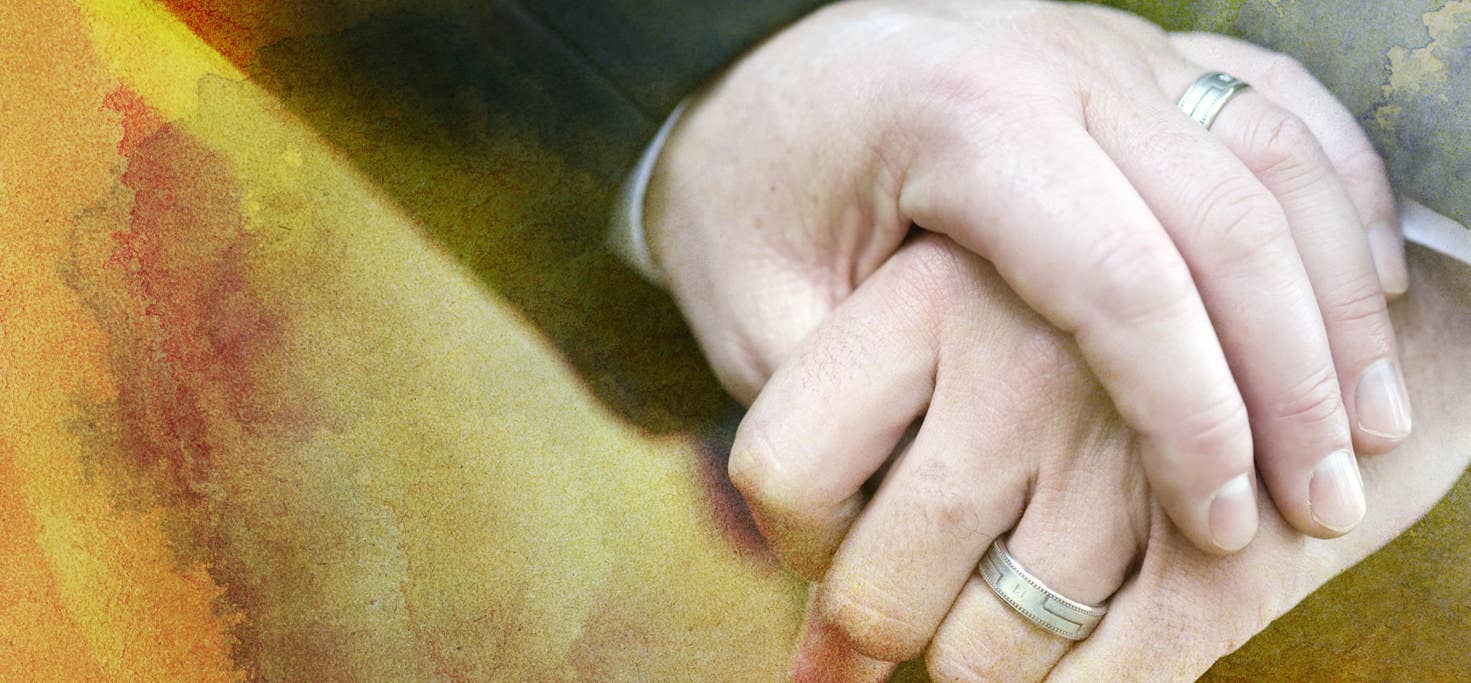
Lyle Shelton isn't one of those religious fundamentalists you see standing at the pulpit, his hands clenched in fists of rage, spewing invective about how we're all going to hell in a handbasket.
Sitting with BuzzFeed News in a busy Sydney café on a sunny afternoon, the head of the Australian Christian Lobby is simply preaching a message of love, tolerance, and respect. He's not a hater, he insists, just a good Christian and a voice for the voiceless.
His critics, however, say his message is one of intolerance and bigotry, which does untold damage to young LGBT Australians.
One thing that's not in dispute is that Lyle Shelton is widely considered one of the biggest roadblocks to marriage equality in Australia.
How has this small-time politician from country Queensland stopped a social movement that has become unstoppable in every other English-speaking nation in the world?
Depending on whom you ask, Lyle Shelton is either a hardworking warrior for social justice who eschews power and fame for the gritty work of getting things done, or he's a cunning political operator with a direct line into the halls of power, which allows him to implement his agenda.
The man himself says he's just a humble servant of the Lord, whose faith drives him to work for the change he believes in even if he knows it's a losing effort.
"One of my Roman Catholic friends said to me if I had a patron saint, it would be Saint Jude, the patron saint of hopeless causes," he tells BuzzFeed News.
For Shelton, the call to God came early in his life. As the son of a Pentecostal pastor in deeply religious Toowoomba, Queensland, faith has always been a part of his life.
His father, Ian Shelton, was a founder of the Toowoomba City Church, which has its roots in the Logos Foundation, a reconstructionist, dominionist, charismatic church that was prevalent in the '70s and '80s.
The foundation's founder, Howard Carter, set up shop in Toowoomba, but when he was found to be an adulterer in the late '80s he was forced out. Shelton's father took over and the church has thrived ever since.
"We embraced faith very early," Lyle says. "My dad was a pastor in the local church. It was a very positive experience from my point of view. Obviously, everybody's got to embrace their faith from an early age, and that's something I did."
After leaving Queensland for a stint in journalism as a young man, mainly covering industry politics in regional Victoria, Shelton returned to Toowoomba in the late '90s to work in his father's church, but it wasn't long before the call to power came.
"I suppose I became interested in pro-life issues and also the intersection of Christianity and public policy in my teenage years and that's something that grew from the pro-life cause initially," he says.
He was elected to Toowoomba council in 2000 and made a name for himself fighting what he saw as immorality. In 2005 Lyle took a bus with 50 placard-carrying locals to the state parliament in Brisbane, protesting the adult entertainment industry and calling on the government to prevent the expansion of the live sex trade.
After a failed run for state office as a National in the 2006 Queensland election, Shelton soon found himself working at the Australian Christian Lobby (ACL).
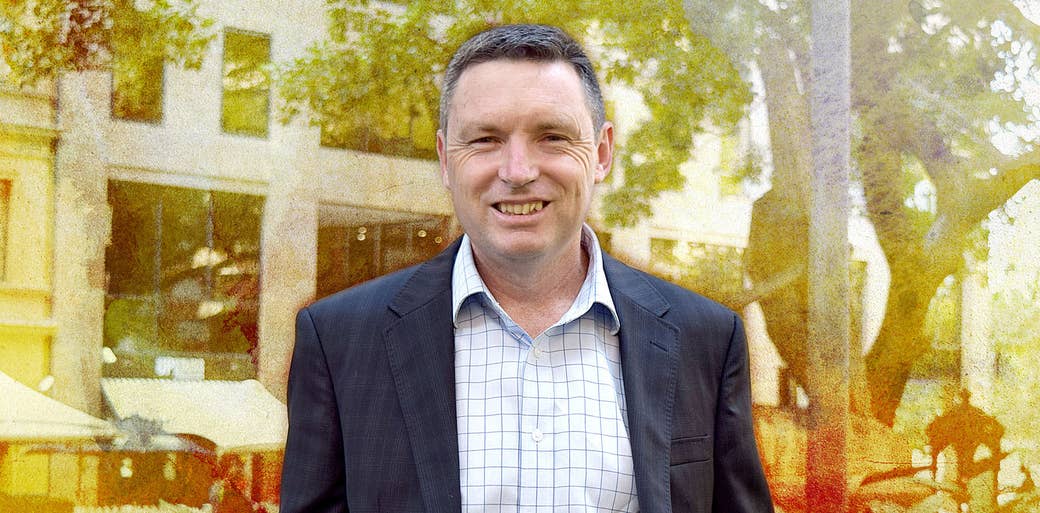
The ACL is widely considered one of the most powerful lobby groups in Australia, able to sway votes and control outcomes on the issues it holds dear.
Speaking at the ACL's annual conference has become a rite of passage for Australia's political aspirants. John Howard, Kevin Rudd, and Tony Abbott have all addressed the ACL.
In 2012, then-Prime Minister and avowed atheist Julia Gillard was due to address the ACL before she cancelled on them after comments from the lobby's then-leader, Jim Wallace. (Wallace compared the health effects of being gay to those of smoking.)
In 2014, Labor Opposition Leader Bill Shorten addressed the conference to stand up for LGBT rights and for same-sex marriage: "When I see people hiding behind the bible to insult and demonise people on the basis of who they love, I cannot stay silent," said Shorten. "I do not agree."
For a decade now, the lobby has focused much of its attention on the battle to stop same-sex marriage in Australia. It's a battle they've won so far, and there's no sign of that changing any time soon.
The ACL's power lies not just in its ability to mobilise a large army of supporters, who bombard MPs and senators with phone calls and automatically generated emails, but also in its direct lines to powerful MPs.
"Lyle's never been able to put forward a religious case against same-sex marriage," says Alex Greenwich, the independent state MP for Sydney and former head of Australians for Marriage Equality (AME).
"He strikes me as more of a political operator than someone who is driven by faith. He seems to enjoy the wheeling and dealing of power.
"He makes sure he's close to people like [Liberal conservatives] Eric Abetz and Kevin Andrews, making sure he's close to the right wing of the Liberal party."
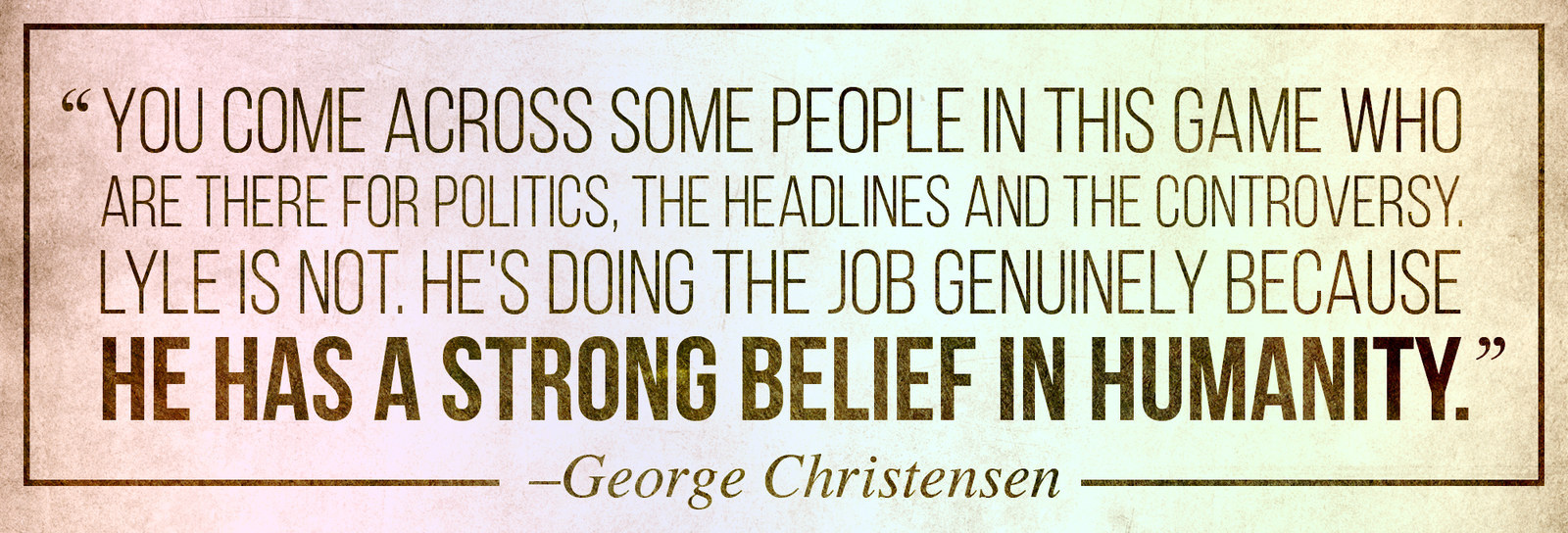
George Christensen, the conservative National MP for the Queensland seat of Dawson who has known Shelton since their days together in local government, doesn't share Greenwich's assessment.
"Lyle has a very genuine concern for people," Christensen says. "That's the reality. You come across some people in this game who are there for politics, the headlines and the controversy. Lyle is not. He's doing the job genuinely because he has a strong belief in humanity."
The man himself says he is motivated purely by his faith.
"It's social justice that especially drives me. Especially for those who can't speak for themselves. Which is obviously the poor and the marginalised. But also children who are voiceless in various debates," he says.
What then of the marginalised LGBT youth in Australia, who according to a 2013 report from mental health initiative beyondblue have the highest rates of suicide of any population in Australia?
The beyondblue report stated that "discrimination and exclusion are the key causal factors of LGBT mental ill-health and suicidality," but Shelton is adamant his organisation strives to avoid that sort of discrimination.
Beyond comparing being gay to smoking, former ACL leader Jim Wallace was lambasted in 2012 when he said a gay marriage campaign would "do great credit to Joseph Goebbels" during a televised debate with the Jewish gay rights campaigner Dr Kerryn Phelps.
On Anzac Day 2011 Wallace was forced to apologise for and delete a tweet that read, "Just hope that as we remember Servicemen and women today we remember the Australia they fought for - wasn't gay marriage and Islamic!"
Shelton is less combative than his predecessor, but he also drew the ire of the LGBT community when he said Australia is at risk of creating a new Stolen Generation of children who are raised in nontraditional households. It's a comparison he stands by.
"I think the effect on children is the same, yes. You're removing a child from its parents. The context of that comment was [former prime minister] Kevin Rudd's backflip [to supporting same-sex marriage]. This was the man who quite rightly apologised to the Stolen Generation. But how can you say on the one hand that it's wrong to remove children, then create public policy which does the same thing? Those are the dots I was trying to connect," he says.
"I'm sure it's very difficult [for same-sex parents to hear this]. I don't doubt their love for their children at all. I do not bring that into question. But the fact is, every child in a same-sex family structure has been taken from its biological mother or father. Now we have to ask as a society, is that right to do that? That doesn't deny anyone's ability to love, or the genuineness of that love."
Shelton is adamant that he's not interested in demonising queer Australians, and seems particularly upset by the idea that the ACL incites hatred.
"That grieves me any time I hear that," he says. "I don't hate anyone. And I feel like just because you have a disagreement with someone, instead of engaging in an argument, you get labelled a hater and a bigot. That distresses me greatly because I don't hate anyone," he says.
"There's times when I could have chosen my words better," he admits. "But in 15 years of the ACL being on the scene, and particularly in the last 10 or 11 years that this has been an issue, If they're the only two examples of hatefulness, we've done pretty well."
Shelton is also adamant that the bile flows both ways.
"If you look at some of the things that have been said about us," he says. "Look at the Hyatt's website when they closed down our conference." (In 2014, progressive activists forced the conservative World Congress of Families to change venues several times.) "The things we were called there I couldn't repeat, but it was absolute vitriol. It was aimed at driving us out of the debate. It was aimed at shutting us down. So I think we've done pretty well. Have we always been perfect? No."
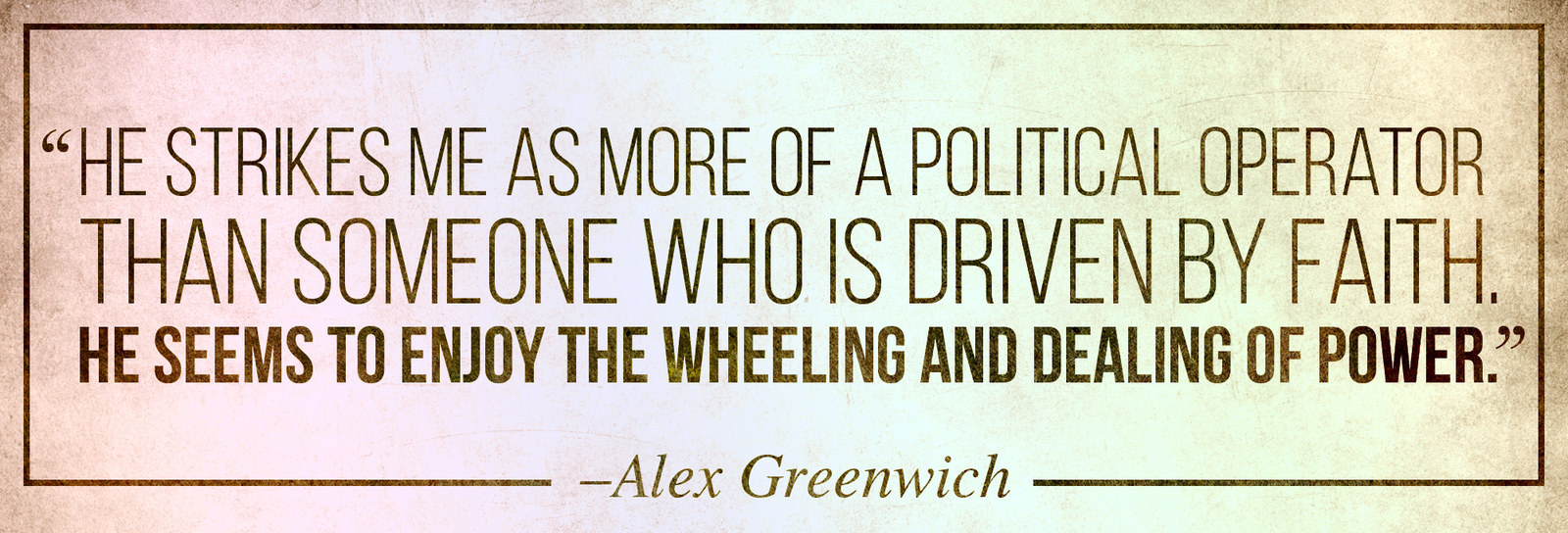
Shelton's colleague at the Australian Christian Lobby, its Queensland director Wendy Francis, also defends him.
"Lyle really is very passionate about people's rights. He was instrumental in repealing dozens of federal laws that discriminated against homosexuals." (The Rudd/Gillard government repealed dozens of laws that discriminated against LGBT Australians, a move the ACL supported.) "So you can't say it comes from a place of hate. Lyle doesn't have a vendetta. He believes in equality strongly," Francis says.
But Alex Greenwich finds Shelton's protestations difficult to believe.
"Lyle is very rational and intelligent. I don't see how a rational, intelligent person couldn't see that these words, this demonising of LGBT people, is anything but hurtful to the LGBT community," he says.
"The ACL sees its audience as a handful of politicians. They're forgetting that their advertisements and their words are being seen by the wider community and, importantly, by young LGBT people. When people see an ad saying that there's something wrong with you, that is of course going to have an impact," Greenwich says.
It's not just queer people who bear the brunt of the ACL's words. The real targets of Christian lobby campaigns are the men and women in Canberra who will vote for reform.
In late March, a bill from Liberal Democrat Senator David Leyonhjelm to legalise same-sex marriage in Australia was brought forward for debate. It would mean, finally, that prime minister Tony Abbott's Liberal party room would need to decide whether it would allow a conscience vote on the issue.
Lobbyists on both sides of the argument went into overdrive, beseeching their supporters to email MPs and lobby for or against a free vote for the Liberals.
In the end, the furious activity was for naught. Senator Leyonhjelm pulled the bill when it became clear it would not pass. That didn't stop the ACL from bragging that it had saved the day.
"With advocates for redefining marriage aggressively lobbying Liberal MPs and senators ahead of this morning's party room meeting, more than 20,000 Australians responded by emailing Liberal parliamentarians urging them to continue to vote as one," the ACL said in a press release under the heading "Liberal party room holds the line on marriage".
In truth, the issue never came up for discussion.
(Australians for Marriage Equality also bragged that 11 Liberal MPs had switched to supporting same-sex marriage, a claim that seems unlikely in retrospect.)
The man who introduced the bill says the email campaigns were pointless.
"I was encouraged to bring on the debate in the Senate, so I arranged for that Thursday for my bill to be debated," Senator Leyonhjelm told BuzzFeed News.
"I wasn't intending to bring it to a vote, but I was told [by Liberal same-sex marriage supporters] that the Liberal party room wouldn't consider the issue of a conscience vote until it was listed for debate.
"I was told by some Liberal insiders that it would prompt a discussion in the party room and bring the conscience vote issue to a head. I don't think [the email campaign] had the slightest bit of impact on the issue not being raised in the party room. The guys who encouraged me just didn't have their act together."
But the phone and email campaigns certainly do get MPs' attention.
"The quantity of emails is astounding," Leyonhjelm says. "The Liberal senators complained that they got thousands of emails in the ensuing few days from the Monday, when it became known that I was intending to list my bill for debate on the Thursday.
"Two of my advisers were receiving the calls. Both of them are female. Some of the calls were very offensive to them. My office manager in Sydney was actually a bit distressed about it. Some of them were quite foul. We had quite a number of fairly gross emails."
George Christensen agrees: "We just get absolutely hammered with thousands from all over Australia. I would guess 99% of them are from outside the electorate."
And so, one has to ask, if the email campaigns are unlikely to sway any MPs' votes, should a Christian lobby really be spending so much time talking about same-sex marriage?
A BuzzFeed News analysis of the ACL's national media releases over the last two years shows it spends more time talking about same-sex marriage than any other issue.
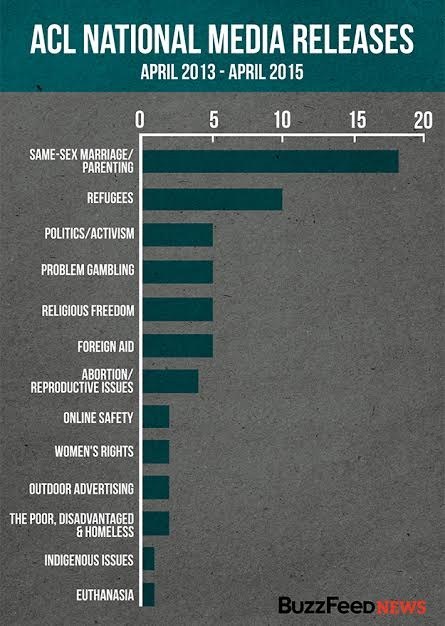
In two years they've sent out 18 national media releases on same-sex marriage, compared to just one on indigenous issues, two on the poor, disadvantaged, and homeless, and five on gambling reform.
Only the issue of refugees comes close with 10 national releases in the past 24 months.
"The ACL is pitching to a constituency who feel very strongly about this, and they exercise a lot of influence with that constituency," says federal Labor MP and marriage equality supporter Tim Watts.
"The churches in my electorate come to me with a much broader range of issues. They want to talk to me about asylum seekers and income equality. The ACL is not representative of the feedback I receive from religious groups in my electorate."
Shelton says he'd much rather be talking about the refugee crisis emanating from the Middle East than same-sex marriage in Australia.
"We aren't the ones who have tried 15 times to change the law. We'd have no interest in this if it wasn't for others driving this debate politically," he says.
"I'd rather discuss the 2 million refugees in Lebanon who have been pushed out because of Islamic State and the Syrian civil war, and the people who are internally displaced in northern Iraq. Those are the big issues. Australia's hopeless response in increasing our humanitarian intake, in helping not only Christians but Yazidis and Muslims. That to me is a far bigger issue," he says.
As Shelton chats to BuzzFeed News, though, it's clear that his passions very much lie with the same-sex marriage debate.
For Shelton, the issue comes down to the rights of children, and whether, in his words, all kids have the right to a mum and dad wherever possible.
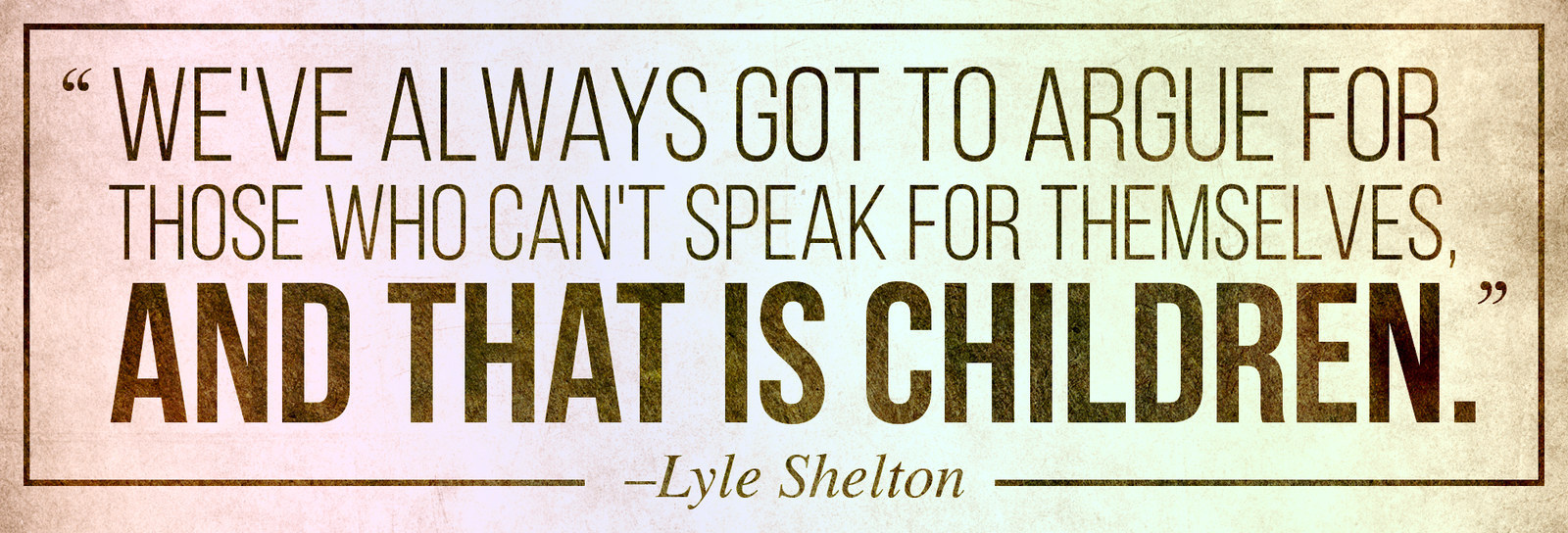
"No political party should legislate for a family structure that requires a child to miss out on a mother and a father," he says.
There are around 33,000 same-sex oriented families in Australia. In many cases, the children in these families are from previous heterosexual unions. In other cases the kids may come from adoption or IVF. According to most reports, these kids are doing just fine, but Shelton doesn't accept that the horse has bolted on the issue of same-sex parenting.
"Maybe perhaps the horse has partially bolted and perhaps, to some degree, the culture. But we've always got to argue for those who can't speak for themselves, and that is children."
A 2014 study by the University of Melbourne found that children raised in same-sex families fare as well as, if not better than, kids from more traditional homes, but Shelton isn't convinced that the issue of same-sex parenting has been settled. (He dismisses the study's self-selected, small sample size.)
For him, same-sex marriage and same-sex parenting are inextricably linked, and he cannot support either concept.
"I think the debate has been a very immature debate," he says. "It's been focused on the rights of adults. Well that's one aspect of the debate. We've been trying our best to raise people to thinking that there are consequences for this. That it does require a child to miss out on their biological mother and father and that's something that civil society shouldn't do."
"We want to say that as a civil society we believe it is just for children to have every opportunity to be raised by their biological mother and father wherever possible. And where it's not possible, we want to restore something that's as close to what they would have through natural causes as possible, because gender does matter to the raising of a child. And there's plenty of social science to prove that. Social sciences do not dispute that children do best on virtually every measure when raised by their biological mother and father. That's not in dispute."
To back his cause Shelton cites a controversial 2012 study by US academic Mark Regnerus. The Regnerus study found that the children of gay and lesbian parents had negative outcomes in significantly more categories than kids from more traditional families.
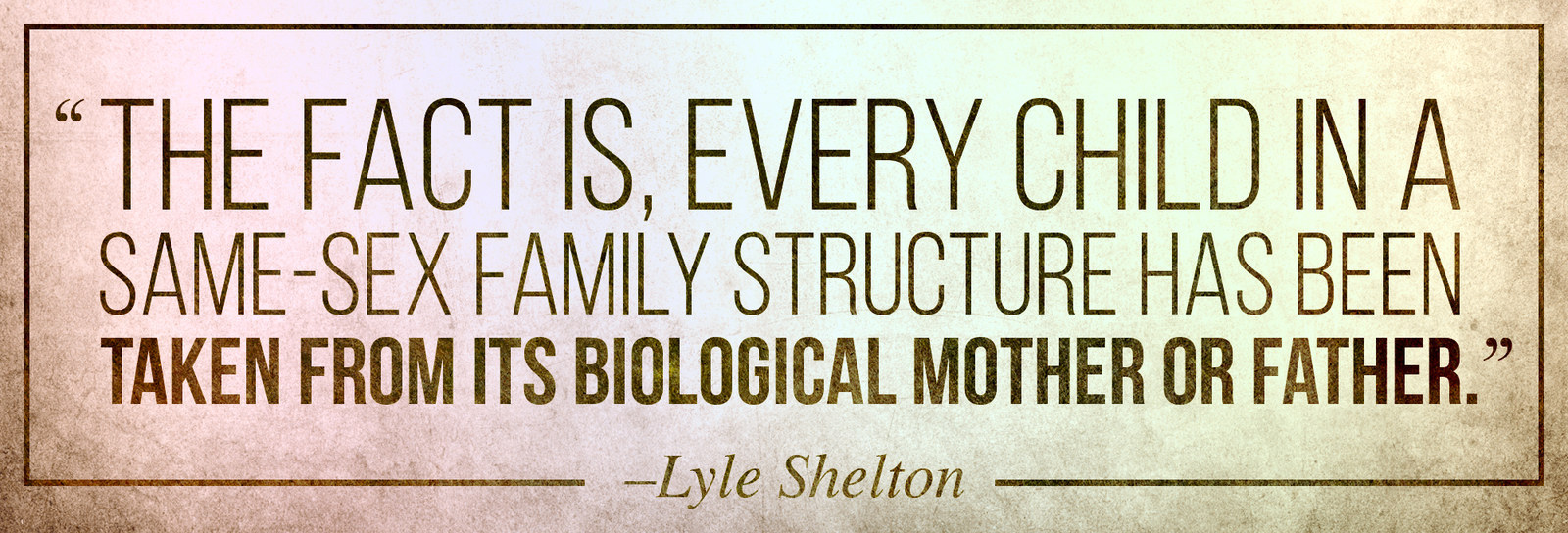
The study created a storm of controversy when it was published and was criticised by the American Medical Association, the American Sociological Association, and the American Academy of Pediatrics, but the University of Texas declared that no formal investigation into the study was warranted.
Of criticism of Regnerus's work, Shelton says: "The thing about this debate is, if you say something that challenges the orthodoxy, all hell breaks loose. Literally. Unfortunately this debate has been conducted in an atmosphere of fear and demonisation instead of looking at the evidence."
Shelton's views on sex and sexuality could at best be described as old-fashioned.
He's not convinced that a person's sexuality is innate and believes that the sexual revolution has taken society to a dangerous place.
"I think where we are today with the gay marriage debate is a result of the 60s and 70s in one sense, where sexual expressionism seems to be the ultimate right," he says. "And now we're causing everything else to be in subservience to that and that's why it's difficult to have a conversation around family structure and the best way to raise children. Because our rights to sexual expressionism seem to trump everything with the way the culture has gone."
"Heterosexuals have done a pretty good job at trashing marriage, and I guess where we [the ACL] are heading against the cultural tide is saying, 'well hang on, maybe as a society we've got to have a look at whether what happened in the 60s and 70s was actually a good idea.'"
"I'm not talking about some sort of Victorian, prudish approach to sexuality or whatever. But what do we need to do as a society for human flourishing? Particularly for the flourishing of the next generation and I'm not sure that sexual expressionism provides the answers to that."
It's Shelton's views on sexuality that are perhaps most informative. His passion is clear as he speaks about the rights of a child to a mother and father. This is a man in no doubt that he is fighting on the right side of this debate. He's clear that his fight to prevent same sex marriages is about saving children and protecting the next generation.
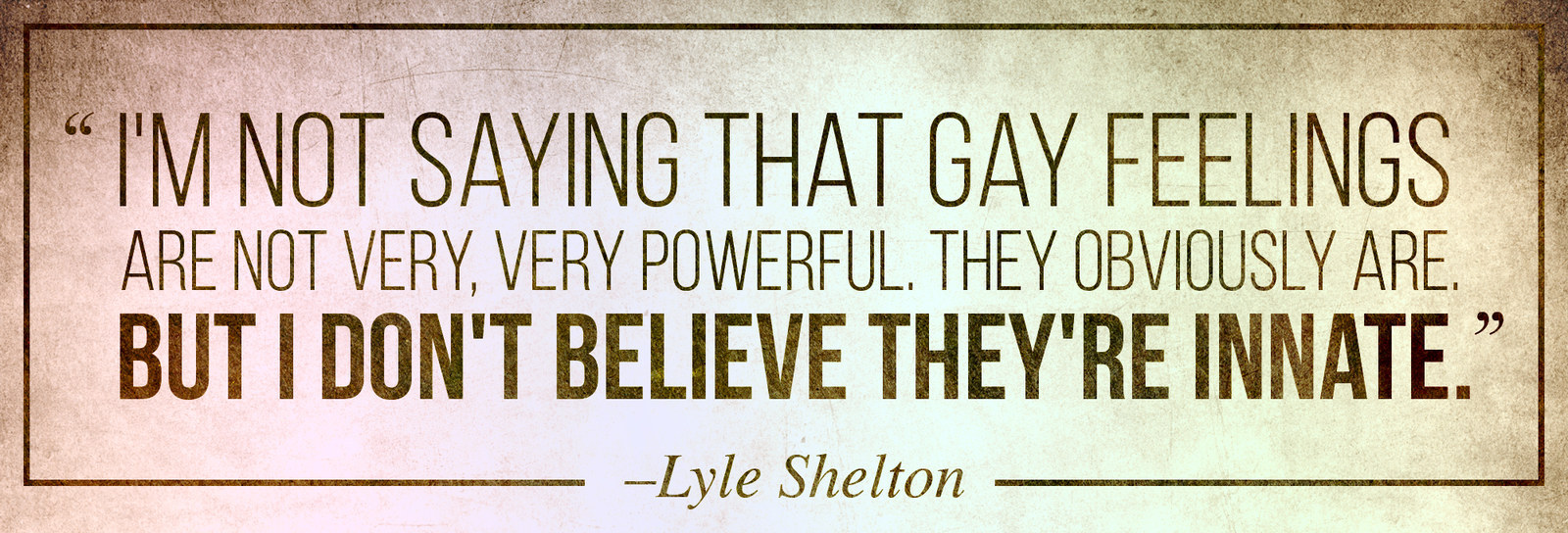
Much of Shelton's world view seems to be informed by his beliefs on sexuality. He believes that a person's sexuality is about the physical act of sex and that everyone has some level of choice over their sexual preference.
Couched in discussion of the rights of children to a mother and father is Shelton's unshakable belief that same-sex attracted people are broadly not suited to raising children and that much of this debate comes down to a lifestyle choice.
"There's no scientific evidence to prove that. I'm not saying that gay feelings are not very, very powerful. They obviously are. But I don't believe they're innate. And the fact that many people have periods of their life where they feel attracted one way sexually and then another way. And the fact that you have "LGBT...I..." the whole range [of letters in LGBTIQ], the whole gamut. I don't think that it's something that you could say is innate. And certainly there's been no scientific evidence to that effect," he says.
"We all have strong and powerful desires. All of us. I think if you accept that argument, [that sexuality is innate] then yes, the debate would essentially be over."
"But I don't think that's right at all. And the fact that it is so fluid for so many people, then that isn't the basis on which to make public policy which affects children," he says.
Shelton believes the battle for same-sex marriage is more about the LGBT community seeking mainstream legitimacy than entering into the institution of marriage.
"I think it's part of the whole gay political agenda... it's not necessarily about marriage, it's about acceptance, and I think there are other ways to achieve acceptance rather than to change public policy on marriage," he says.
"Our acceptance of anyone who is same-sex attracted is not based on their sexuality it's based on who you are as a person.
"If we've failed as a society", he says pensively, "and if Christians have failed and there has been a failure to accept who you are… I don't think any of us are defined by our sexuality. We're defined by who we are as human creatures. That's where I think both sides of this debate have been wrong in the past.
"I think that's where we've failed in the past, we haven't accepted each other on that basis and I think that's the starting point of our discussion and that's where public policy should flow from – our anthropology of who we are as creatures, not as we're defined by our sexuality."
Ultimately, Shelton concedes that the battle against same-sex marriage is one the ACL is likely to lose. It's more a question of when, not if. But he remains hopeful that Australia can have a deeper, more meaningful debate before that happens.
"I'm an optimist," he says. "Certainly the signs don't always look good. But I believe if the public have the opportunity to think deeply about this debate, I think the truth about the needs of the child, if that's raised in the consciousness of the public, I think we'll see that this is something we do need to protect as a cultural norm."
"I suppose you've got to believe. If you believe that what you're doing can make a difference for people, that gives you the motivation to keep going."
Shelton knows he is fighting the tide of popular opinion, but he also knows that in the end there are only a handful of people who will actually need to vote for reform.
"With legislators, they often have to do the hard thinking that the general public don't. You can even be asked the question by a pollster, but if you've got to sit down and write public policy and think about the consequences of changes for freedom of conscience and the rights of a child, all these things that come into play.
"I think those are the reasons we see parliamentarians resistant to this change. Because they know that there are consequences to this. And often the public are a bit behind that, and need to be brought on that journey."
As polling consistently shows that a majority of Australians now back marriage reform, Shelton's sphere of influence in this arena continues to shrink. Increasingly, he needs to talk not to mainstream Australia, but to the 226 members of the Australian parliament. These are the people who ultimately will decide whether or not gay and lesbian Australians are worthy of the institution of marriage.
And in the end, those members are the only people Lyle Shelton needs to convince.
